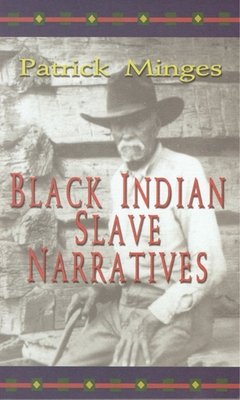Black Indian Slave Narratives

Black Indian Slave Narratives
Few people realize that Native Americans were enslaved right alongside the African Americans in this country. Fewer still realize that many Native Americans owned African Americans and Native Americans from other tribes. Recently, historians have determined that of the 2,193 interviews with former slaves that were collected by the Federal Writers' Project, 12 percent contain some reference to the interviewees' being related to or descended from Native Americans. In addition, many of the interviewees make references to their Native American owners. In Black Indian Slave Narratives, Patrick Minges offers the most absorbing of these firsthand testimonies about African American and Native American relationships in the 19th century. The selections include an interview with Felix Lindsey, who was born in Kentucky of Mvskoke/African heritage and who served as one of the buffalo soldiers who rounded up Geronimo. Chaney Mack, whose father was a "full-blood African" from Liberia and whose mother was a "pure-blood Indian," gives an in-depth look at both sides of her cultural heritage, including her mother's visions based on the "night the stars fell" over Alabama. There are stories of Native Americans taken by "nigger stealers," who found themselves placed on slave-auction blocks alongside their African counterparts. The narratives in this collection provide insight into the lives of people who lived in complex and dynamically interconnected cultures. The interviews also offer historical details of capture and enslavement, life in the Old South and the Old West, Indian removal, and slavery in the Indian territory.
Patrick Minges worked for 17 years for Amnesty International and Human Rights Watch. He teaches in Stokes County Schools and at Forsyth Technical Community College in Winston-Salem. He is also the author of Slavery in the Cherokee Nation: The Keetowah Society and the Defining of a People, 1855-1867 and Far More Terrible for Women: Personal Accounts of Women in Slavery.This book is an important contribution to the dialogue about relationships between African-Americans and Native-Americans, and the complex political context in which these narratives were recorded. Patrick does not over-analyze this often emotional subject. He simply allows the people to tell their stories. -Wilma Mankiller
PRP: 111.29 Lei
Acesta este Pretul Recomandat de Producator. Pretul de vanzare al produsului este afisat mai jos.
100.16Lei
100.16Lei
111.29 LeiLivrare in 2-4 saptamani
Descrierea produsului
Few people realize that Native Americans were enslaved right alongside the African Americans in this country. Fewer still realize that many Native Americans owned African Americans and Native Americans from other tribes. Recently, historians have determined that of the 2,193 interviews with former slaves that were collected by the Federal Writers' Project, 12 percent contain some reference to the interviewees' being related to or descended from Native Americans. In addition, many of the interviewees make references to their Native American owners. In Black Indian Slave Narratives, Patrick Minges offers the most absorbing of these firsthand testimonies about African American and Native American relationships in the 19th century. The selections include an interview with Felix Lindsey, who was born in Kentucky of Mvskoke/African heritage and who served as one of the buffalo soldiers who rounded up Geronimo. Chaney Mack, whose father was a "full-blood African" from Liberia and whose mother was a "pure-blood Indian," gives an in-depth look at both sides of her cultural heritage, including her mother's visions based on the "night the stars fell" over Alabama. There are stories of Native Americans taken by "nigger stealers," who found themselves placed on slave-auction blocks alongside their African counterparts. The narratives in this collection provide insight into the lives of people who lived in complex and dynamically interconnected cultures. The interviews also offer historical details of capture and enslavement, life in the Old South and the Old West, Indian removal, and slavery in the Indian territory.
Patrick Minges worked for 17 years for Amnesty International and Human Rights Watch. He teaches in Stokes County Schools and at Forsyth Technical Community College in Winston-Salem. He is also the author of Slavery in the Cherokee Nation: The Keetowah Society and the Defining of a People, 1855-1867 and Far More Terrible for Women: Personal Accounts of Women in Slavery.This book is an important contribution to the dialogue about relationships between African-Americans and Native-Americans, and the complex political context in which these narratives were recorded. Patrick does not over-analyze this often emotional subject. He simply allows the people to tell their stories. -Wilma Mankiller
Detaliile produsului








